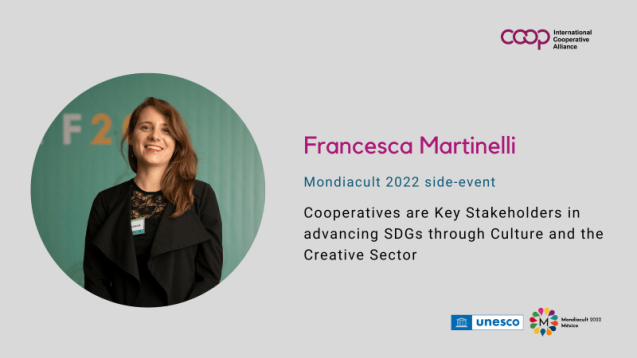Translate To:
Mondiacult 2022 side-event | Q&A with Francesca Martinelli
18.10.2022 13:13:43

The ICA hosted a session on 26.09.2022 at the UNESCO World Conference on Cultural Policies and Sustainable Development – MONDIACULT 2022. The theme was “Cooperatives are Key Stakeholders in Advancing SDGs through Culture and the Creative Sector”. In a series of interviews with some of those taking part, we hear their views on cooperative enterprises, culture and sustainable development.
Francesca Martinelli is a researcher, author and practitioner in charge of institutional communication and international relations at the Italian cooperative Doc Servizi. She has also been appointed a UNESCO young expert on fair culture.
How do you see the relationship between cooperative enterprise, culture and sustainable development?
Culture raises the level of well-being of a population and should be considered by each state as a primary good, on the same level as health. Therefore, culture should be considered the 18th Sustainable Development Goal (SDG). This means ensuring support for those who work in the world of culture, incentives for the public, and ensuring new forms of participation. Cooperatives can be important allies because they have always been laboratories of participation and innovation, and already offer solutions to many of the problems of culture, putting cultural production, sustainable careers, and accessibility to the culture at the core of their activity.
What activities does your own cooperative do in this area? And how does this fit with your role as a UNESCO young expert on fair culture?
I work at Doc Servizi, the largest Italian cooperative in the entertainment field with more than 6,700 members. Since 1990, our members combine the intellectual independence typical of self-employment with social protection due to employees, since they are hired by the cooperative. In this way, artists access better working conditions and fight undeclared work. My work gives me many ideas on how to carry out the concept of “fair culture”, which is a new UNESCO concept that aims to adapt Fair Trade principles to cultural and creative sectors, advocating for fair working conditions for artists and cultural professionals as well as for fair exchange and trade relations in the cultural sector. With 14 other young experts, over the next few years, I will be working on refining this concept and linking it to implementation practices and proposals.
How can the cooperative and the fair culture movements be mutually beneficial?
Working in Doc Servizi, I see first-hand the difficulties that artists face in having their work recognised, and how cooperatives enable them to obtain adequate working conditions. On the one hand, I think that cooperatives have a lot to say on the subject of “fair culture” because making the production and exchange of cultural and creative work more equitable and sustainable is one of the main objectives of cooperatives. On the other hand, this concept can enrich the perspectives of the cooperative movement in the cultural sphere, stimulating the building of synergies between the global South and North.
In your view, what are the main outcomes of the ICA side-event at Mondiacult 2022?
For me, the most important result is a greater awareness on the part of the cooperative movement that the experiences we bring to the creative and cultural sectors are relevant. Our cooperative philosophy fits perfectly with the objectives of the cultural world and also of UNESCO. And we should not be afraid to show our success stories. This meeting was a further step towards a new ICA-UNESCO alliance, which will be crucial in the future to promote workers in the cultural and creative sectors.
As part of this series, you can also read interviews with Stefania Marcone(Legacoop), Caroline Woolard (www.Art.coop), Christine M Merkel (expert at the German Commission for UNESCO) and Fabíola da Silva Nader Motta (Organization of Brazilian Cooperatives (OCB)).
ICA's side-event at Mondiacult related material
Watch the full side-event in English, Spanish and French.
Find an extended coverage of the event here.
Find the profile of speakers here.
Find pictures of the event here.
Watch a short video of cooperative voices having participated onsite in the event here.
